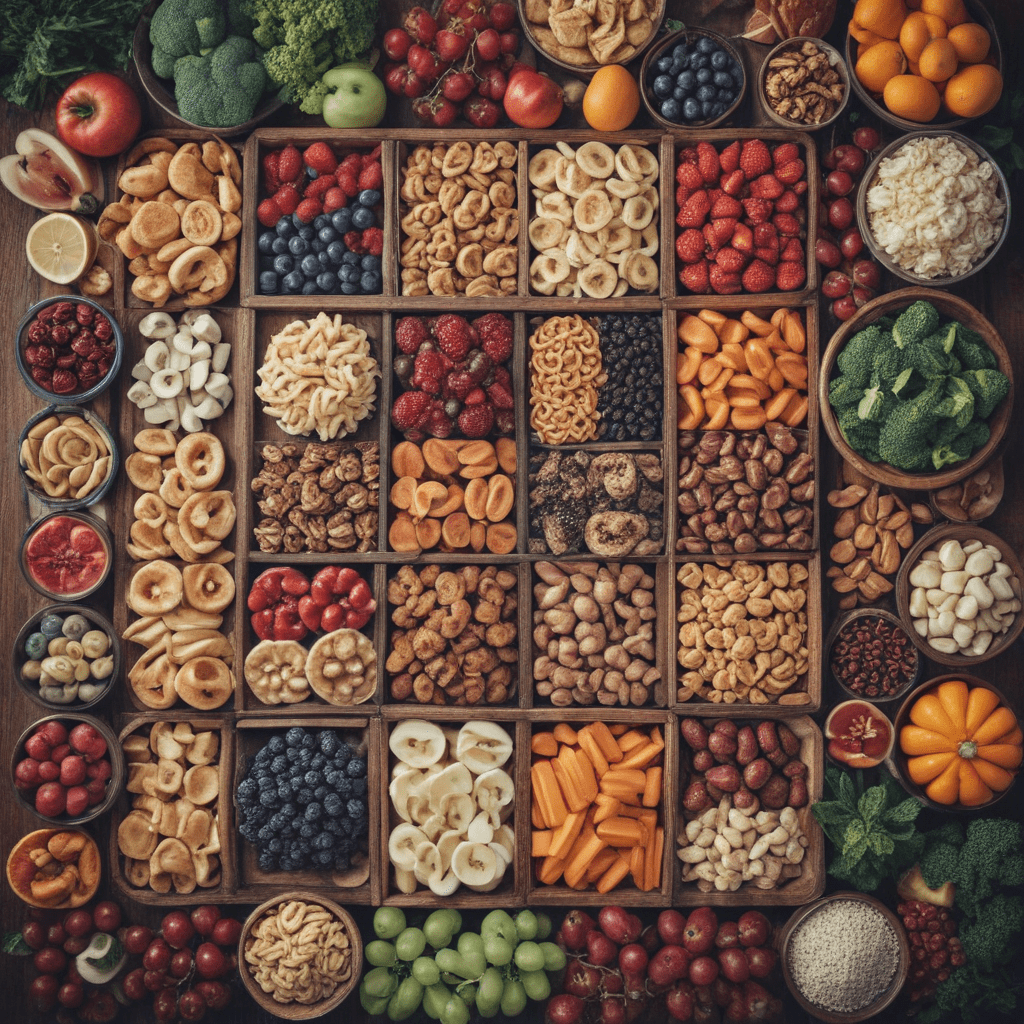
Snack Planning for Success: Strategies for Consistent Healthy Eating
1. Understanding the Importance of Snacking
Snacking often gets a bad reputation, but it can be a valuable tool for maintaining a healthy diet and lifestyle. When done right, snacking can provide essential nutrients, boost energy levels, and help manage hunger between meals.
Regular snacking can help regulate blood sugar levels, preventing energy crashes and cravings that can lead to overeating later in the day. Snacks can also provide essential nutrients that may be lacking in your main meals, contributing to overall health and well-being.
Furthermore, snacking can be a great way to incorporate more fruits, vegetables, and whole grains into your diet, promoting gut health and reducing the risk of chronic diseases.
However, it's important to remember that not all snacks are created equal. Choosing healthy, nutrient-rich snacks and practicing mindful eating habits are crucial for maximizing the benefits of snacking.
2. Identifying Your Snacking Needs
Before diving into snack planning, it's essential to understand your individual snacking needs. Consider your activity level, dietary restrictions, and specific health goals.
If you're an active individual, you may need more frequent snacks to fuel your workouts and maintain energy levels throughout the day. Similarly, if you have dietary restrictions, you'll need to choose snacks that fit your needs.
For example, if you're gluten-free, you'll need to avoid snacks containing wheat, barley, or rye. Additionally, consider your health goals. If you're trying to lose weight, you'll want to choose snacks that are low in calories and fat.
Once you have a clear understanding of your individual needs, you can start planning snacks that are tailored to your specific requirements.
3. Setting Realistic Snacking Goals
Setting realistic snacking goals is crucial for success. Start by evaluating your current snacking habits and identifying areas for improvement.
For example, if you tend to reach for unhealthy snacks when you're stressed or tired, set a goal to replace those snacks with healthier options.
Similarly, if you find yourself skipping snacks altogether, set a goal to incorporate one or two healthy snacks into your daily routine.
Remember, small, achievable goals are more likely to lead to long-term success.
4. Creating a Snacking Schedule
Creating a snacking schedule can help you stay on track and avoid unhealthy snacking choices. Plan your snacks for the week ahead, considering your daily activities and meal times.
This will help ensure you have healthy snacks on hand when hunger strikes.
It's also a good idea to prepare your snacks in advance. This could involve chopping vegetables, making a batch of trail mix, or preparing a smoothie to grab and go.
Having healthy snacks readily available will make it easier to resist the temptation to reach for unhealthy options.
5. Building a Healthy Snack Pantry
Building a healthy snack pantry is essential for successful snacking. Stock your pantry with a variety of nutrient-rich snacks, such as:
- Fruits and vegetables: Choose a variety of fresh, frozen, or dried fruits and vegetables.
- Nuts and seeds: These provide healthy fats, protein, and fiber.
- Whole grains: Opt for whole-wheat crackers, bread, or cereal.
- Yogurt: Choose plain yogurt and add your own fruit or nuts for sweetness.
- Hard-boiled eggs: A great source of protein and healthy fats.
By having a well-stocked pantry, you'll always have healthy options on hand when you need a snack.
6. Preparing Quick and Easy Snacks
Preparing quick and easy snacks is essential for staying on track with your healthy snacking goals.
Here are some ideas for quick and easy snacks that you can prepare in advance:
- Fruit and yogurt parfait: Layer yogurt, granola, and your favorite fruits in a jar or container.
- Trail mix: Combine nuts, seeds, dried fruit, and whole-grain cereal for a wholesome and satisfying snack.
- Hard-boiled eggs: Hard-boil a few eggs at the beginning of the week for a quick and protein-rich snack.
- Veggie sticks with hummus: Cut up your favorite vegetables and pair them with hummus for a healthy and refreshing snack.
- Smoothies: Blend together your favorite fruits, vegetables, and yogurt for a quick and nutritious smoothie.
These are just a few examples, and there are endless possibilities when it comes to quick and easy snacks.
7. Mindful Snacking: Avoiding Emotional Eating
Mindful snacking is the practice of paying full attention to your snack experience. This means avoiding distractions like watching TV or scrolling through your phone while you eat.
Instead, focus on the taste, texture, and aroma of your food. Mindful snacking helps you to savor your food and avoid overeating.
Another important aspect of mindful snacking is avoiding emotional eating. Emotional eating is the tendency to eat in response to emotions, such as stress, boredom, or sadness.
If you find yourself reaching for snacks when you're feeling emotional, try to find healthier ways to cope with those emotions, such as exercise, talking to a friend, or journaling.
8. Incorporating Variety into Your Snacks
Variety is key to a healthy diet, and snacks are no exception.
Try to incorporate a variety of different types of snacks into your diet to ensure you're getting a wide range of nutrients.
For example, include a mix of fruits, vegetables, whole grains, protein, and healthy fats in your snacks.
Variety will also help keep your taste buds happy and prevent boredom.
9. Staying Hydrated Between Snacks
Staying hydrated is essential for overall health and can also help to curb snack cravings.
Aim to drink plenty of water throughout the day, especially between meals and snacks.
If you find it difficult to drink plain water, try adding a slice of lemon or cucumber for flavor.
You can also enjoy unsweetened herbal teas or sparkling water as alternatives.
10. Tracking Your Progress and Adjusting as Needed
It's important to track your progress and make adjustments to your snacking plan as needed.
Keep a food diary or use a tracking app to monitor your snacks and their impact on your energy levels, hunger, and overall health.
If you find that certain snacks are causing you to feel sluggish or overly full, adjust your choices accordingly.
Remember, snacking is a personal journey, and it's important to find an approach that works best for you.
Frequently Asked Questions
Q: How many snacks should I eat per day?
A: The number of snacks you need per day depends on your individual needs. Consider your activity level, dietary restrictions, and health goals. If you're unsure, it's best to talk to a registered dietitian or healthcare professional.
Q: What are some healthy snack ideas for kids?
A: Some healthy snack ideas for kids include fruit and yogurt parfaits, trail mix, hard-boiled eggs, veggie sticks with hummus, and smoothies. You can also try making homemade snacks like baked kale chips or banana bread.
Q: What are some tips for dealing with snack cravings?
A: Some tips for dealing with snack cravings include staying hydrated, getting enough sleep, and managing stress. You can also try distracting yourself with an activity you enjoy or reaching out to a friend for support.
Q: What are some common snacking mistakes?
A: Some common snacking mistakes include skipping snacks altogether, choosing unhealthy snacks, and emotional eating.
By following the tips outlined in this article, you can avoid these mistakes and make snacking a healthy and enjoyable part of your day.

